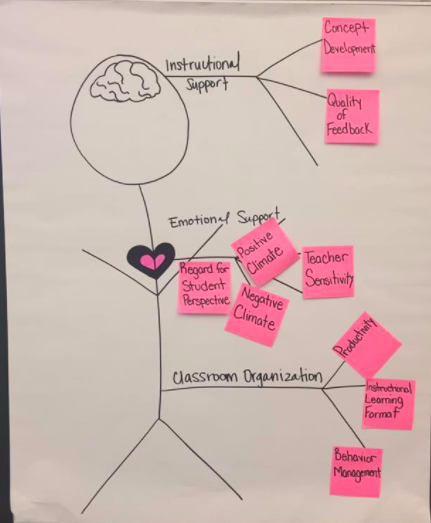
CLASS® specialists are always thinking about the complexity of the CLASS tool as we prepare for our trainings. As a trained CLASS observer, I am comfortable observing and recognizing quality interactions that fit in the tool. But I needed a strategy to convey this information to those who may not be as familiar with the tool.
As it turns out, using an analogy is a perfect way to make the complex relatable, less overwhelming, and more familiar to our participants.
When I train or coach educators that aren’t familiar with the CLASS tool, or are brand new to it, I like to compare the CLASS with the different parts of a body.
How CLASS Is Like a Body

Emotional Support Is the Heart
The Emotional Support domain is the heart of the body. It refers to certain behaviors that help children develop warm, supportive relationships, experience enjoyment and excitement about learning, feel comfortable in the classroom, and experience appropriate levels or autonomy or independence. Think of it as all the feels.
Classroom Organization Is the Skeleton
The Classroom Organization Domain is the skeleton of the body. It refers to specific behaviors that help children develop skills to regulate their behavior, get the most learning out of each day, and maintain interest in learning activities. Think of that “well-oiled machine” that runs smoothly and efficiently. Just as your bones are the structure of your body and hold everything in place, CO is the structure of the classroom.
Instructional Support Is the Brain
The Instructional Support Domain is the brain of the body. It refers to specific teaching behaviors that support children’s cognitive development and language growth. Here, children learn to analyze and reason; they learn to connect concepts and acquire new language--all with the support of a highly skilled teacher who provides feedback to continue to take the child to the next level.
The Power of an Analogy
Analogies can transform a message, concept, or technical topic into terms anyone can understand. Analogies are powerful, because they allow us to convey complex or technical information and ideas to an unfamiliar audience.
Here are five benefits of using analogies. They:
- Make the complex simple
- Identify similarities and differences
- Bridge new ideas to familiar ideas
- Add believability
- Connect topics to the audience members’ lives
Did you notice all the concept development going on right there?
Why does this matter?
Analogies are one of the more powerful devices in your arsenal of rich communications tools. By using them, you help make your message clear, simple, believable, relatable, and memorable.
Your analogies will be most effective if they are:
- Visual – they paint a picture for the audience (or yourself!).
- Relevant and diverse – they use diverse genres of analogies instead of just one type (like sports) to ensure that you connect with audience members universally.
- Memorable and repeatable – they are witty and provocative.
The next time you are talking about CLASS with others, think about what kind of analogies you can use to help you provide this new knowledge to others. Analogies are like sandwiches; you can make them out of anything.


